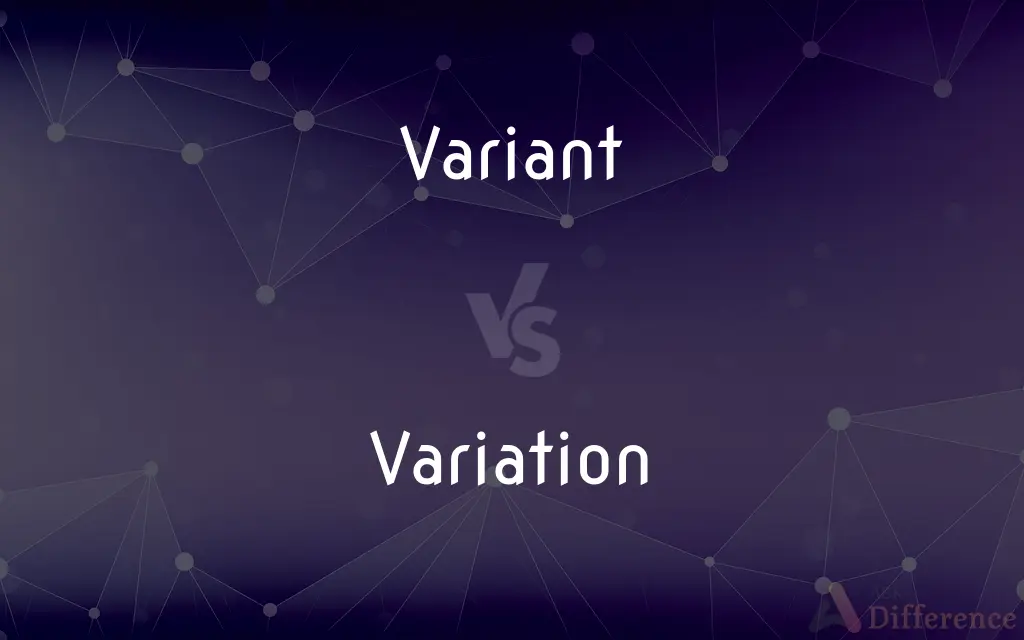Variant vs. Variation — What's the Difference?
By Tayyaba Rehman & Maham Liaqat — Updated on April 2, 2024
Variant describes a form of something that differs in some way from other forms, focusing on divergence, while variation refers to the range or extent of difference within a group, emphasizing change.

Difference Between Variant and Variation
Table of Contents
ADVERTISEMENT
Key Differences
A variant is a version of something that displays noticeable differences from its standard form or other versions, emphasizing the idea of an alternative or deviation. Whereas variation refers to the differences observed when comparing multiple instances or forms within a group or over time, focusing on the diversity or range of changes.
Variant often implies a distinct version that has been intentionally created or has evolved, such as a variant of a virus or a product model, suggesting a specific, identifiable difference. On the other hand, variation encompasses the concept of natural diversity or deviation found within a population, process, or series of items, without necessarily implying a clear-cut distinction.
In genetics, a variant is a specific mutation or alteration in the genetic sequence that makes it different from the reference sequence. Whereas variation in this context refers to the broader concept of genetic diversity within a species or population, highlighting the spectrum of genetic differences.
In linguistics, a variant is a form of a word, expression, or grammatical construction that differs in some way from another form considered standard within a language or dialect. Variation, however, refers to the range of differences or alterations in language use observed among speakers, regions, or social groups, emphasizing linguistic diversity.
In product design and manufacturing, a variant represents a particular model or version of a product that has been altered to include different features or specifications from the original. On the other hand, variation can refer to the variability or inconsistency found in the quality or characteristics of products produced under the same conditions, indicating a measure of deviation or fluctuation.
ADVERTISEMENT
Comparison Chart
Definition
A specific form that differs in some way from others
The range or degree of differences within a group
Emphasis
On distinct, identifiable differences
On the spectrum or extent of change
Context of Usage
Often used in genetics, products, languages
Used broadly in statistics, biology, linguistics
Implication
Intentionality or evolution of a distinct form
Natural diversity or deviation
Example in Biology
A specific genetic mutation
Genetic diversity within a population
Compare with Definitions
Variant
A configuration of a product model that differs in features or specifications.
The sport variant of the car includes a turbocharged engine.
Variation
Fluctuation in the characteristics of something.
Variation in product quality can affect customer satisfaction.
Variant
A version of something that differs in some aspect from other versions.
The electric variant of the sedan offers an extended range.
Variation
Genetic diversity within a population.
Genetic variation is crucial for a species' adaptability.
Variant
A mutation or altered form of a gene.
Scientists have identified a new variant of the virus.
Variation
The degree or range of differences among a set of things.
There's a wide variation in temperature across the region.
Variant
A different spelling, form, or version of a word.
Color and colour are variants of the same word.
Variation
Different forms or versions of something within a group.
The song has gone through several variations over the years.
Variant
An alternative version of a product designed for a specific use.
The latest smartphone comes in two variants: one with more storage and another with a better camera.
Variation
A change or deviation in condition, amount, or level.
Daily variation in mood is normal for many people.
Variant
Differing from others of the same kind or from a standard
A variant form of the disease.
A book in variant editions.
Variation
A change or slight difference in condition, amount, or level, typically within certain limits
Regional variations in house prices
The figures showed marked variation from year to year
Variant
Having or exhibiting variation; varying
A procedure producing variant results.
Variation
A different or distinct form or version of something
Hurling is an Irish variation of hockey
Variant
Something that differs from others of the same kind or from a standard, as a different spelling or pronunciation of a word.
Variation
The act, fact, or process of varying.
Variant
Showing variety, diverse.
Variation
The extent or degree to which something varies
A variation of ten pounds in weight.
Variant
Showing deviation or disagreement.
Variation
Something different from another of the same type
Told a variation of an old joke.
Variant
(obsolete) Variable.
Variation
Magnetic declination.
Variant
(programming) Covariant and/or contravariant.
Variation
(Biology) The existence within a species or other group of organisms of differences in form, function, or behavior, especially when hereditary.
Variant
Something that is slightly different from a type or norm.
All breeds of dog are variants of the species “Canis lupus familiaris”.
The word "kerosine" is a variant of “kerosene”.
Variation
(Mathematics) A function that relates the values of one variable to those of other variables.
Variant
(genetics) A different sequence of a gene (locus).
Variation
A form that is an altered version of a given theme, diverging from it by melodic ornamentation and by changes in harmony, rhythm, or key.
Variant
(computing) A variable that can hold any of various unrelated data types.
Variation
One of a series of forms based on a single theme.
Variant
One of a set of words or other linguistic forms that conveys the same meaning or serves the same function.
Variation
A solo dance, especially one forming part of a larger work.
Variant
Varying in form, character, or the like; variable; different; diverse.
Variation
The act of varying; a partial change in the form, position, state, or qualities of a thing.
Variant
Changeable; changing; fickle.
He is so variant, he abit [abides] nowhere.
Variation
A related but distinct thing.
When the process didn't work, we tried a variation.
All of his soups are variations on a single recipe.
Variant
Something which differs in form from another thing, though really the same; as, a variant from a type in natural history; a variant of a story or a word.
Variation
(nautical) The angular difference at the vessel between the direction of true north and magnetic north.
Magnetic declination
Variant
An event that departs from expectations
Variation
(board games) A line of play that differs from the original.
Variant
(biology) a group of organisms within a species that differ in trivial ways from similar groups;
A new strain of microorganisms
Variation
(music) A technique where material is repeated with alterations to the melody, harmony, rhythm, timbre, texture, counterpoint or orchestration; but with some invariant characteristic, e.g. a ground bass.
Variant
A variable quantity that is random
Variation
(genetics) The modification of a hereditary trait.
Variant
Something a little different from others of the same type;
An experimental version of the night fighter
An emery wheel is a modern variant of the grindstone
The boy is a younger edition of his father
Variation
(astronomy) Deviation from the mean orbit of a heavenly body.
Variant
Differing from a norm or standard;
A variant spelling
Variation
The act of varying; a partial change in the form, position, state, or qualities of a thing; modification; alteration; mutation; diversity; deviation; as, a variation of color in different lights; a variation in size; variation of language.
The essences of things are conceived not capable of any such variation.
Variation
Extent to which a thing varies; amount of departure from a position or state; amount or rate of change.
Variation
Change of termination of words, as in declension, conjugation, derivation, etc.
Variation
Repetition of a theme or melody with fanciful embellishments or modifications, in time, tune, or harmony, or sometimes change of key; the presentation of a musical thought in new and varied aspects, yet so that the essential features of the original shall still preserve their identity.
Variation
One of the different arrangements which can be made of any number of quantities taking a certain number of them together.
Variation
An instance of change; the rate or magnitude of change
Variation
An activity that varies from a norm or standard;
Any variation in his routine was immediately reported
Variation
A repetition of a musical theme in which it is modified or embellished
Variation
Something a little different from others of the same type;
An experimental version of the night fighter
An emery wheel is a modern variant of the grindstone
The boy is a younger edition of his father
Variation
An artifact that deviates from a norm or standard;
He patented a variation on the sandal
Variation
The angle (at a particular location) between magnetic north and true north
Variation
(astronomy) any perturbation of the mean motion or orbit of a planet or satellite (especially a perturbation of the earth's moon)
Variation
(biology) an organism that has characteristics resulting from chromosomal alteration
Variation
(ballet) a solo dance or dance figure
Variation
The act of changing or altering something slightly but noticeably from the norm or standard;
Who is responsible for these variations in taxation?
Common Curiosities
Is a variant always intentional?
Not always; variants can arise naturally, such as genetic mutations, or can be intentionally created, like product models.
How is variation measured?
Variation can be measured using statistical methods to quantify the degree of difference or diversity.
What is a variant?
A variant is a specific form or version of something that exhibits differences from a standard or other versions.
Can a variant lead to variation?
Yes, multiple variants within a population or group can contribute to overall variation.
Why is variation important in biology?
Variation is crucial for evolution and the survival of species, as it enables adaptability to changing environments.
What does variation mean?
Variation refers to the range, diversity, or degree of differences observed within a group or over time.
How does a variant differ from variation?
A variant emphasizes a distinct or identifiable difference, while variation focuses on the spectrum of changes or differences within a group.
What role do variants play in language?
Variants in language reflect regional, social, or contextual differences in the use of words, expressions, or grammatical structures.
Can variation exist without variants?
Theoretically, variation implies differences, which would suggest the presence of variants, even if they are not explicitly identified as such.
How do manufacturers manage product variants?
Manufacturers manage product variants through strategic planning and inventory management to meet diverse consumer needs.
Are all variations beneficial?
Not all variations are beneficial; some can be neutral or even detrimental, depending on the context.
What impact do linguistic variants have?
Linguistic variants can impact communication, reflecting cultural, regional, and social identities.
Does every variant represent a significant change?
Not necessarily; some variants may only exhibit minor differences that do not significantly alter the overall function or appearance.
How do variants arise in nature?
Variants in nature can arise through mutations, genetic recombination, and other evolutionary processes.
Can human activity create variants?
Yes, human activities such as selective breeding, genetic engineering, and product design can create variants.
Share Your Discovery

Previous Comparison
Enchilada vs. Chalupa
Next Comparison
Tunnel vs. ArchAuthor Spotlight
Written by
Tayyaba RehmanTayyaba Rehman is a distinguished writer, currently serving as a primary contributor to askdifference.com. As a researcher in semantics and etymology, Tayyaba's passion for the complexity of languages and their distinctions has found a perfect home on the platform. Tayyaba delves into the intricacies of language, distinguishing between commonly confused words and phrases, thereby providing clarity for readers worldwide.
Co-written by
Maham Liaqat














































